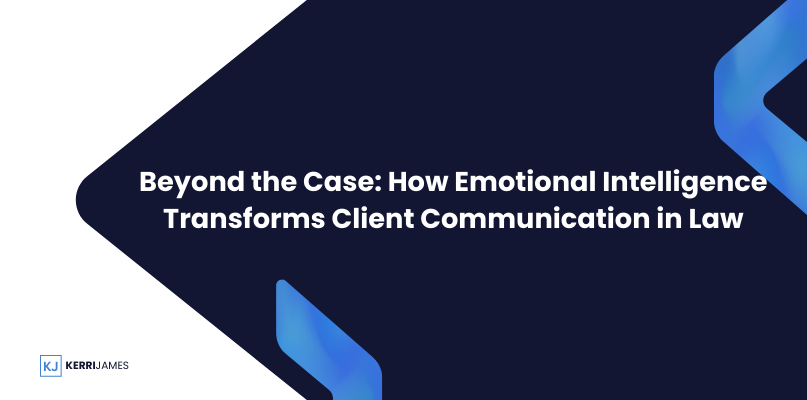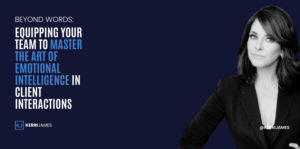In the legal profession, known for its emphasis on logic, reason, and objective analysis, the power of emotions can sometimes be underestimated or even overlooked. However, clients navigating the legal system are not simply rational actors processing information; they are individuals grappling with a complex and often overwhelming array of emotions – fear, anxiety, anger, grief, hope, uncertainty, and vulnerability. For lawyers, paralegals, and intake teams, the ability to recognize, understand, respond to, and effectively manage these emotions is not just a valuable “soft skill”; it’s a crucial competency that can profoundly impact client experience, communication effectiveness, the strength of the attorney-client relationship, and ultimately, the success and reputation of the firm. Emotional intelligence (EI), the ability to perceive, understand, manage, and utilize emotions effectively, both your own and those of others, plays a vital role in navigating the often-turbulent emotional landscape of legal proceedings. This article explores how emotionally intelligent legal professionals can decode client emotions, even when unspoken, building rapport, alleviating concerns, diffusing conflict, and creating a more comfortable, supportive, and empowering experience that encourages clients to choose their services and fosters lasting loyalty.
The Power of Emotional Intelligence in Legal Practice: Beyond Legal Expertise, Towards Human Connection
Emotional intelligence (EI), or EQ, encompasses a set of essential skills that help individuals navigate the complex world of emotions with awareness, empathy, and effectiveness. While often associated with interpersonal skills, EI is especially powerful in the legal profession, where attorneys frequently encounter clients facing intense emotional situations, vulnerability, and stress. In this context, EI goes beyond being an optional soft skill; it becomes a fundamental competency that can set exceptional legal professionals apart.
High EI in legal practice brings several benefits, fostering deeper, more supportive relationships with clients and colleagues alike. Attorneys with strong EI are not only skilled in understanding and managing their own emotions but also in recognizing and responding to the emotions of those around them. This awareness is particularly valuable when working with clients who may be feeling overwhelmed, anxious, or even defensive. For lawyers, intake specialists, and other legal professionals, EI enables them to create a positive client-centered experience that promotes trust and transparency.
One core element of EI is empathy—the ability to understand and share in the emotions of others. Legal professionals with high empathy can better connect with clients, listening attentively to their concerns and showing that they are understood. This connection encourages clients to be open and honest, providing attorneys with critical insights into their values, fears, and motivations. An empathetic approach also demonstrates that the attorney respects the client’s emotional journey, which can be essential in high-stakes situations such as family law, criminal defense, or personal injury cases.
Another essential component of EI in legal practice is self-regulation. Attorneys often work under significant stress, handling deadlines, complex cases, and emotionally charged clients. Self-regulation allows attorneys to manage their own reactions and remain calm and composed under pressure, making it easier to think clearly, communicate effectively, and prevent emotions from clouding judgment. By maintaining their own emotional stability, attorneys can respond constructively to challenging situations and avoid escalating conflicts, creating a more positive experience for clients.
Effective communication, another key aspect of EI, is also integral to legal practice. Attorneys with high EI can adjust their communication style to meet the needs of individual clients, offering reassurance or firmness as the situation requires. They are also adept at navigating difficult conversations, such as delivering unfavorable news or managing clients’ expectations. By communicating clearly, empathetically, and without judgment, legal professionals help clients understand their options and make informed decisions.
Conflict resolution is another area where EI shines in legal practice. Legal professionals encounter conflicts not only in negotiations and courtroom settings but also in managing differing client expectations. Those with high EI can manage these conflicts constructively, facilitating discussions, de-escalating tensions, and working toward solutions that respect each party’s needs.
In essence, EI enables legal professionals to go beyond technical expertise, offering a human-centered approach that prioritizes connection, empathy, and understanding. By integrating EI into their practice, lawyers and legal teams create a more supportive environment that fosters trust, encourages open communication, and ultimately leads to better outcomes for both clients and legal practitioners. In a field where expertise is expected, the ability to connect on a human level is what truly differentiates an exceptional attorney.
Key Components of Emotional Intelligence in Client Interactions: A Deeper Dive
Self-Awareness: Understanding Your Own Inner Landscape: The foundation of emotional intelligence is self-awareness – the ability to recognize and understand your own emotions, their impact on your behavior, your reactions to stressful situations, and how they influence your interactions with others, particularly clients who may be experiencing heightened emotional states. Self-aware legal professionals are better able to manage their own emotional responses to challenging client situations, preventing countertransference (the projection of their own emotions onto the client), maintaining professionalism and composure even in emotionally charged situations, and creating a more stable, predictable, and supportive environment for their clients, fostering trust and open communication.
Social Awareness: Decoding the Unspoken Language of Emotions: Social awareness, a crucial component of EI, involves the ability to accurately perceive and interpret the emotions of others, even when those emotions are not explicitly expressed verbally. Emotionally intelligent lawyers and intake teams are adept at reading nonverbal cues, such as body language, facial expressions, tone of voice, subtle shifts in demeanor, eye contact, and even micro-expressions, to gain a deeper understanding of the client’s underlying emotional state, unspoken concerns, and unexpressed needs. This ability to “read between the lines” and perceive the emotional subtext of client communications allows them to respond with empathy, address unspoken anxieties, validate client feelings, and build stronger, more meaningful connections.
Self-Regulation: Mastering Your Emotional Responses: Self-regulation, the ability to manage your own emotions effectively, is paramount in the emotionally charged environment of legal practice. Legal professionals with strong self-regulation skills are able to remain calm and composed under pressure, manage their reactions to challenging or even provocative client behavior, avoid escalating conflict, and maintain a professional and empathetic demeanor even when faced with difficult or emotionally charged situations. This emotional stability creates a more reassuring and supportive experience for clients, fostering trust, reducing anxiety, and promoting open communication.
Relationship Management: Building Bridges of Trust and Rapport: Relationship management, the culmination of the other EI components, involves the ability to build and maintain positive and productive relationships, navigate social dynamics effectively, influence others positively, and resolve conflicts constructively. Emotionally intelligent legal professionals excel at building rapport with clients from the first interaction, establishing a foundation of trust, communicating effectively and empathetically, and resolving disagreements or conflicts in a way that preserves the relationship and achieves mutually beneficial outcomes. These strong, trust-based relationships contribute to increased client satisfaction, loyalty, positive word-of-mouth referrals, and a stronger reputation for the firm.
Practical Applications of Emotional Intelligence in Client Interactions: Real-World Scenarios
In legal practice, the capacity to connect with clients on an emotional level can be as impactful as technical expertise. Emotionally intelligent legal professionals are adept at understanding and responding to clients’ needs, fears, and unspoken anxieties, fostering trust and building lasting relationships. Here are some practical applications of emotional intelligence (EI) in real-world scenarios, showcasing how this skill set can enhance client interactions and elevate the quality of legal representation.
1. Building Rapport and Trust from the First Encounter
The first client interaction often sets the tone for the entire attorney-client relationship. Emotionally intelligent legal professionals recognize the importance of creating a positive and welcoming first impression. By actively listening to the client’s initial concerns and responding with empathy, they immediately signal their commitment to understanding and supporting the client.
In practice, this might involve using a warm and reassuring tone of voice, making consistent eye contact, and ensuring that the client feels heard and valued. For example, if a client expresses concerns about the complexity of their case, an emotionally intelligent attorney might respond, “I can see that this is overwhelming. We’ll work through it together, step by step.” This validation creates a safe, comfortable environment that encourages open communication. Establishing this connection builds a strong foundation of trust that can carry through the entire legal process, helping clients feel supported and engaged.
2. Managing Client Anxiety and Distress in Emotionally Charged Situations
Legal matters, particularly those involving personal or financial stakes, can be highly stressful for clients. Emotionally intelligent legal professionals can recognize signs of distress, such as nervous behaviors, a worried tone, or frequent questions about risks. Instead of dismissing or minimizing these concerns, they acknowledge the client’s emotional experience, which can alleviate anxiety and build confidence.
For instance, in a family law case involving child custody, a client might express fears about the potential outcomes and the impact on their relationship with their child. An emotionally intelligent attorney could respond with, “I understand that this is an incredibly difficult time for you. Let’s go through each step carefully, and I’ll make sure you’re informed and supported throughout the process.” By addressing both practical concerns and emotional needs, the attorney reduces anxiety and fosters a sense of empowerment, encouraging the client to feel more in control of their situation.
3. Navigating Difficult Conversations with Grace, Empathy, and Clarity
Difficult conversations are inevitable in legal practice, whether delivering unfavorable news, discussing sensitive topics, or managing disagreements. Emotionally intelligent lawyers handle these moments with empathy, transparency, and respect, focusing on maintaining the relationship even while addressing challenging issues.
For example, if a client’s case has taken an unexpected turn, an emotionally intelligent attorney would deliver the news with sensitivity, stating, “I know this isn’t what you were hoping to hear, but I want to make sure you understand the full picture. Let’s look at our options moving forward.” This approach conveys honesty and care, demonstrating the attorney’s commitment to guiding the client through difficult moments. By framing the conversation around possible solutions, the attorney helps the client process the information constructively, which preserves trust and promotes a more collaborative approach to problem-solving.
4. Resolving Conflicts Constructively, Preserving Relationships
Conflicts can arise in any attorney-client relationship, whether due to differing opinions on case strategy or dissatisfaction with the pace of progress. Emotionally intelligent professionals excel at managing these conflicts in a way that preserves relationships. They achieve this by managing their own emotions, actively listening to the client’s perspective, and finding common ground that meets both parties’ needs.
For instance, if a client is frustrated with the perceived lack of progress on their case, an emotionally intelligent attorney might listen without interruption, validate the client’s feelings, and respond with, “I understand your concerns and why you’re feeling this way. Let’s discuss the steps we’re taking and what we can adjust to ensure you feel more informed.” This response shows respect for the client’s viewpoint while offering a clear plan for moving forward. By addressing conflicts with empathy and transparency, attorneys strengthen the client relationship, demonstrating their commitment to both the client’s legal goals and emotional well-being.
5. Building Trust, Fostering Client Loyalty, and Generating Positive Referrals
When legal professionals consistently demonstrate empathy, responsiveness, and active listening, they cultivate deep trust with their clients. This bond of trust often translates into long-term loyalty and positive word-of-mouth referrals, both of which are invaluable to a law firm’s growth and reputation.
Consider a scenario in which a personal injury attorney works with a client who has been traumatized by an accident. By demonstrating patience, validating the client’s emotions, and actively communicating throughout the process, the attorney shows a level of commitment that goes beyond mere legal representation. After the case concludes, the client may feel a strong sense of gratitude, leading to future referrals and endorsements of the firm’s compassionate, client-centered approach. This ripple effect of positive client experiences fosters a reputation for exceptional service, attracting new clients and supporting long-term growth.
Developing Emotional Intelligence in Legal Teams: Cultivating Essential Skills for Success
Emotional intelligence (EI) is a vital skill set that enhances a legal professional’s ability to understand and respond to clients, colleagues, and challenging situations effectively. While certain aspects of EI—such as empathy or self-awareness—might come naturally to some individuals, EI is largely a set of competencies that can be cultivated over time. Investing in the development of EI within a legal team is an investment in better client outcomes, a more positive workplace culture, and ultimately, the long-term success of the firm. Here’s how firms can develop and nurture EI within their teams.
Emotional Intelligence Assessments: Identifying Strengths and Areas for Growth
To begin fostering EI within a legal team, firms can start by assessing current levels of emotional intelligence among team members. Validated EI assessments provide a baseline understanding of each team member’s strengths and areas for improvement, focusing on dimensions such as self-awareness, social awareness, self-regulation, and relationship management.
For example, a team member with high social awareness but low self-regulation might excel in understanding others’ perspectives but struggle to manage their own responses under pressure. These insights allow firms to tailor training efforts to address the specific EI needs of each team member, helping them build a more well-rounded skill set. By identifying these strengths and weaknesses, firms can direct resources toward targeted EI development, making training initiatives more effective and relevant.
Moreover, the process of taking an EI assessment can encourage self-reflection among team members, prompting them to think about their interactions with clients and colleagues from a fresh perspective. This self-reflective practice builds self-awareness, a core component of EI, and opens the door for continuous improvement. When team members recognize their own growth potential, they are more likely to be receptive to training and mentoring initiatives designed to strengthen their EI competencies.
Targeted Training Programs: Developing Core EI Competencies
Implementing structured training programs focused on building emotional intelligence is an essential step in EI development. These programs can be designed to cover a variety of practical topics relevant to legal settings, such as managing client anxiety, navigating difficult conversations, resolving conflicts constructively, and building rapport. Training methods might include workshops, seminars, online courses, role-playing exercises, and case studies, all of which can help foster core EI competencies in a safe, supportive environment.
For instance, a workshop on managing client anxiety could involve role-playing scenarios where attorneys practice validating clients’ feelings and providing reassuring information. This approach enables attorneys to practice their responses to real-world situations they may encounter, helping them develop the confidence to apply EI skills in actual client interactions. Similarly, role-playing exercises that focus on delivering difficult news to a client teach attorneys how to balance empathy with honesty, demonstrating that even challenging conversations can be conducted with emotional sensitivity.
Such training programs encourage attorneys and staff to see the value in enhancing their EI skills. By practicing these skills in a controlled environment, team members gain experience, confidence, and insight into how emotionally intelligent behavior can positively impact client relationships and case outcomes. Over time, these skills become second nature, leading to a more empathetic and effective team.
Mentorship and Coaching: Guiding and Supporting Professional Development
Mentorship and coaching are powerful tools for developing EI within a legal team. Pairing experienced legal professionals who exhibit high EI with less experienced team members creates a pathway for knowledge transfer and skill development. Mentors provide valuable insights into applying EI in real-world legal practice, offering guidance on handling complex client interactions, navigating office dynamics, and managing their own emotions effectively.
For example, a mentor might share techniques for staying calm and composed in the face of an angry client, demonstrating how to listen actively, validate the client’s frustration, and redirect the conversation toward finding a solution. These real-world examples help mentees see how EI skills can be applied practically, especially in challenging or high-stakes situations. Regular coaching sessions with mentors or external EI specialists can also help individuals identify blind spots in their interactions, set realistic goals for improvement, and track progress over time.
Mentorship and coaching foster a sense of support and community within the firm, creating an environment where team members feel comfortable seeking guidance and feedback. By providing a space for open dialogue about EI development, firms can help individuals grow not only professionally but also personally, fostering a culture of continuous learning and improvement. Over time, mentees become mentors, passing on these skills to new team members, and embedding EI as a core component of the firm’s culture.
Creating a Culture of Empathy, Open Communication, and Client-Centricity
Finally, cultivating a firm-wide culture that prioritizes empathy, open communication, and client-centered service is essential for fostering emotional intelligence. By creating a work environment that values emotional awareness, firms encourage team members to support each other in developing their EI skills and to prioritize these skills in their interactions with clients.
One way to cultivate this culture is by encouraging team members to share their experiences, challenges, and successes in managing client relationships and difficult situations. This sharing of experiences helps normalize emotional expression and demonstrates that discussing one’s emotional responses is not only acceptable but encouraged. When attorneys and staff feel safe to discuss their feelings and emotional challenges, they are more likely to develop self-awareness and emotional regulation, both of which are essential for effective client interactions.
Additionally, firms can reinforce client-centric values by integrating EI principles into team meetings, case debriefs, and performance reviews. For example, during case debriefs, team members might reflect on client interactions, discussing what went well and what could be improved from an emotional intelligence perspective. These conversations help reinforce the importance of empathy, active listening, and open communication in achieving positive client outcomes.
By embedding EI as a core value in the firm’s culture, leaders create an environment where team members are motivated to develop their EI skills continuously. Over time, this commitment to emotional intelligence fosters a firm-wide dedication to client-centered service and empathetic engagement, distinguishing the firm in a competitive legal landscape.
Measuring the Impact of Emotional Intelligence: Demonstrating the Value of EQ
While the impact of emotional intelligence can be profound, it’s also important to measure its tangible effects on client relationships, firm performance, and overall success. Tracking key metrics and gathering client feedback can provide valuable data to demonstrate the ROI of investing in EI development.
Client Satisfaction Scores: Gauging Client Perceptions and Experiences: Regularly assess client satisfaction through surveys, feedback forms, and client interviews. Specifically inquire about their experience with communication, empathy, responsiveness, understanding, trust, the level of comfort they felt throughout the legal process, and their overall satisfaction with their legal representation. Analyze this feedback to identify areas for improvement, refine your approach to client management, demonstrate the value of your firm’s commitment to client well-being, and track the effectiveness of EI training and development initiatives.
Client Retention Rates: A Key Metric of Loyalty and Trust: Track client retention rates over time and analyze any correlation between improved client relationships, enhanced communication, and increased client loyalty. If your efforts to cultivate emotional intelligence within your team are successful, you should see a higher percentage of clients returning for future legal needs, recommending your firm to others, and providing positive testimonials about their experience.
Positive Client Testimonials and Referrals: The Power of Word-of-Mouth Marketing: Actively solicit and monitor the number of positive client testimonials and referrals received. An increase in positive feedback and word-of-mouth marketing can be a strong indicator of client satisfaction, trust, and the positive impact of emotionally intelligent client interactions. Positive testimonials can also be leveraged as powerful marketing tools, showcasing your firm’s commitment to client-centered service and differentiating you from competitors in a crowded legal marketplace.
Case Outcomes and Efficiency: The Ripple Effect of Positive Client Relationships: While not solely attributable to emotional intelligence, improved communication, trust, and cooperation between attorney and client, fostered by emotionally intelligent interactions, can contribute to more efficient case management, smoother negotiations, reduced conflict, and potentially more favorable case outcomes. Tracking these metrics, in conjunction with client satisfaction data, can provide valuable insights into the overall impact of EI on your firm’s performance and success.
Final Words: The Human Element in Legal Practice: Empathy, Connection, and Building Lasting Relationships
In the legal profession, where intellectual prowess and technical expertise are table stakes, emotional intelligence is the differentiating factor that elevates client service, builds trust, fosters lasting relationships, and ultimately, drives success. By recognizing, understanding, and responding to the emotional landscape of clients – their fears, anxieties, hopes, and vulnerabilities – legal professionals can create a more supportive, compassionate, and human-centered legal experience. Developing emotional intelligence within your team is not just an investment in your employees’ professional development; it’s an investment in your clients, your firm’s reputation, and your long-term success in a competitive and increasingly client-centric legal market. For more resources on building a client-centered law firm, enhancing communication skills, developing emotional intelligence, and leveraging the power of human connection in your legal practice, visit our website: [insert internal link here].










